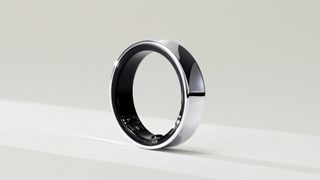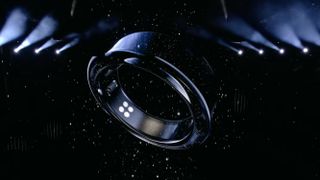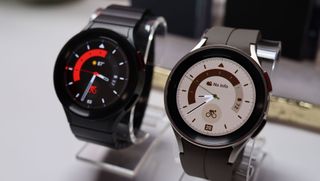The Samsung Galaxy Ring looks set for an official launch today, at the imminent Samsung Galaxy Unpacked event.
Proceedings are due to kick off at 6am PT / 9pm ET / 2pm GMT / 11pm AED, and we’ll be covering every announcement in our Samsung Galaxy Unpacked July live blog. Alternatively, if you’d rather tune into the event yourself, check out our guide on how to watch Samsung Galaxy Unpacked 2024.
We’ve heard quite a lot about the Galaxy Ring in the months since its blink-and-you’ll-miss-it debut, including rumors surrounding its functionality and weight. Read on, then, for everything we know about this upcoming Oura Ring rival and potential best smart ring contender.
Samsung Galaxy Ring: Cut to the chase
- What is it? Samsung’s first-ever smart ring
- When is it out? It’s likely be launched at the next Galaxy Unpacked on July 10
- How much will it cost? No details yet, but probably more than the Galaxy Watch
- What will it feature? Expect all the normal fitness tracking features, as well as AI and perhaps advanced things like blood sugar monitoring
Samsung Galaxy Ring: Release date
We would place a lot of money on the Galaxy Ring making its debut at the next Samsung Galaxy Unpacked event, which is set for July 10.
When exactly it will be released isn’t fully clear, but we’d expect it to arrive soon after the Unpacked announcements, likely a week or so after. And we can foresee Samsung putting Ring preorders live on the day of Unpacked.
Samsung Galaxy Ring: Price
The Samsung Galaxy Ring may have been officially teased at Unpacked 2024 and unveiled at, but we didn’t hear a jot about pricing. Now it’s been officially unveiled (and TechRadar was one of the first publications to get a hands-on look at the ring), we still don’t know. That means we can only speculate based on its existing rivals.
Our benchmark is the Oura ring. In our Oura (Generation 3) review we noted that the device was impressive but relatively expensive compared to a traditional smartwatch coming in at $299 (about £230 / AU$440).
On top of that, you have to pay $5.99 (about £4.50 / AU$8) per month for an Oura membership to keep access to premium features (you do get six months free with your smart ring purchase though).
Another reference point should be Samsung’s best smartwatch. In our Galaxy Watch 6 review we found that the gadget offered comprehensive support for apps and fitness features, and at launch, prices started at $299.99 / £289 / AU$549.

Based on these gadgets we wouldn’t be surprised if the Galaxy Ring came in somewhere around $300 / £300 / $550. Will it be worth that price tag?
On the one hand, the Galaxy Ring is set to offer a whole lot of advanced health metrics, especially in terms of sleep, and will work to do this alongside a major update to the Samsung Health app that’s coming “later this year”. The Ring could also potentially offer more accurate readings than a smartwatch in some areas, and has been confirmed to work with the Samsung Galaxy Watch to improve sleep tracking accuracy.
But on the other hand, the Ring won’t offer much support for the non-health apps found on a Galaxy Watch. There’s no way to actually interact with the Ring like a wrist-worn wearable: there are no buttons, screen, or haptic elements. It’s very much a passive thing.
Still, if you care about health and prefer minimalist accessories, then the Ring is an exciting prospect, even if those looking for more of a smartphone companion will be happier with a smartwatch.
Samsung Galaxy Ring: News and features

Right now, the main things we know for certain is that the Samsung Galaxy Ring exists, will be excellent at sleep tracking, will track activity in some capacities, and will arrive later this year to take on the Oura Ring and others. During our interview at MWC 2024 in Barcelona, the Ring’s main focus (or at least, the main focus of our roundtable) was on its sleep capabilities.
The Ring will track four new metrics that the Samsung Galaxy Watch 6 doesn’t: continuous heart rate during sleep, sleep latency, respiratory rate and night movement. As we’ll see in more detail below, the Ring will use sleep metrics to create a Vitality score and offer sleep apnoea detection.
Away from sleep, the Ring will offer menstrual cycle tracking in partnership with the Natural Cycles app, using a skin temperature sensor. It will collect heart rate information throughout the day. The Ring will track movement, including step count, but does not have GPS. This is in line with the cryptic statements from another Samsung exec who claimed the Galaxy Ring will also offer activity tracking, with “more health features” planned for the future.
We’ve now seen some Galaxy Ring features leaked in the Samsung Health app. It looks as though the smart ring will monitor heart rate, stress, skin temperature, and periods. In partnership with a phone, it’ll also offer snore detection, much like the Galaxy Watch does.
Here’s your first look at some of Galaxy Ring’s health tracking features✅ https://t.co/D0Z5HEQCQV#SamsungUnpacked pic.twitter.com/DbzsOK7gfmJune 30, 2024
The Samsung Galaxy Ring prototypes we’ve handled came in three finishes: Ceramic Black, Gold, and Platinum Silver (its not yet clear whether this is colored plastic or metal plate). The Ring’s inside is black, which is where the sensors and three nodules for increased skin contact are placed.
The prototypes we saw weighed 2.3-29g depending on size, and we saw sizes ranging from US 5 up to US 13. All of this confirms the rumor from an industry insider who said the Samsung Galaxy Ring is “ridiculously light” and that it’s coming in “three finishes” and “sizes up to 13”.
The battery life is unknown, but the battery size ranges from 14.5mAh (smallest) to 21.5mAh (biggest). The Ring

Before its official unveiling, we’d seen reports about a trademark filing and some Samsung patents, which showed a smart ring with sensors that included an electrocardiogram (ECG), for measuring resting heart rate and heart-rate variability.
It seems likely, then, that the Galaxy Ring will be equipped with ECG and PPG (Photoplethysmography) sensors, so it can detect if your heartbeat has any irregular rhythms. The RIng will house an SpO2 monitoring sensor to detect your blood oxygen saturation.
This would all see it play nicely with an incoming Samsung Health app update that the tech giant announced at Unpacked 2024. Samsung said that “later this year” Health will be getting several new features, including “new smart sleep analysis” which informs that sleep apnoea detection mentioned earlier.
Another feature that Samsung has revealed is coming to its Health app later this year is ‘My Vitality Score’ (below), and the Ring will play a part here.
It will also use heart rate variability, overall sleep, activity and resting heart rate to generate a single “Vitality score” which collects data about “physical and mental readiness”. This score has been developed with machine learning in collaboration with the University of Georgia. The Ring will also offer Sleep apnoea detection, done by monitoring blood oxygen levels while you sleep, while also picking up on any disruptions in your breathing.
This sounds very much like Fitbit‘s ‘Daily Readiness Score’ and similar features like ‘Training Readiness’ on Garmin watches, as it crunches together data from your sleep, activity, resting heart rate and heart-rate variability to give you an overall health score alongside tips and advice.
Given that the wearable was announced right after Samsung had crowed about its Health app updates at Unpacked 2024, these previews (like the one above) give a good idea of the kind of features you can likely expect from the Galaxy Ring when it does eventually arrive for health-tracking duty.
Samsung Galaxy Ring: early thoughts
Smart rings are typically more discreet versions of smartwatches – like the Samsung Galaxy Watch 6 – with a greater focus on being a fitness tracker rather than a second screen for your smartphone.
Smart rings are typically less noticeable, more lightweight, and – because they fit more tightly than a watch – sometimes more accurate at measuring data. If you find yourself getting distracted by your smartwatch while swimming, running, or sleeping, a smart ring could be the solution.

We don’t yet know much officially about the Galaxy Ring’s specs and features, only these early subject-to-change ones. However, if that all turns out to be the final design, and the Galaxy Ring plays nicely with the big update to Samsung Health coming “later this year”, then it could be one of the best sleep trackers and best fitness trackers around. We’ll update this page with more official info as soon as we get it.
Services Marketplace – Listings, Bookings & Reviews
